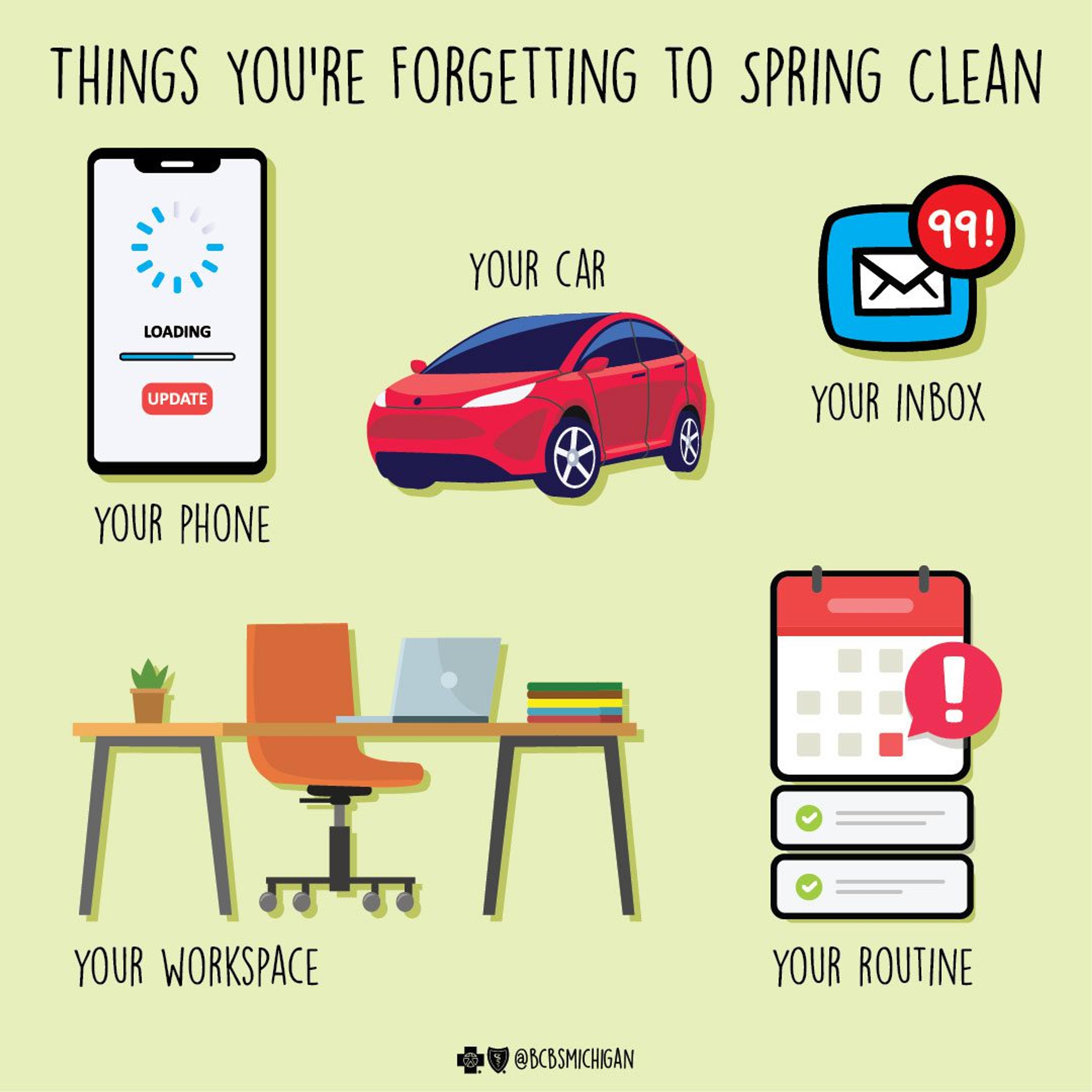6 Things You’re Forgetting to Spring Clean
Amy Barczy
| 4 min read

Changing seasons are a great reminder to address tasks that might otherwise get pushed aside. Case in point: spring cleaning.
Removing clutter and re-organizing everyday spaces in your home is a great exercise to help you reduce stress and improve your focus and concentration. Studies have linked clutter to negative impacts on your well-being.
Spring cleaning often focuses on deep cleaning high-traffic spaces around the house, like the kitchen and appliances, bathrooms, bedroom linens and mattresses. Spring cleaning the yard and garden to clear out dead plants and trash are also common tasks when the weather begins to warm up.
But there may be some parts of your life that you’re forgetting to spring clean. Here are some places that may be more cluttered than you realize – and causing you stress.

1. Your car
Whether you’re the type of person that keeps a clean car, or someone who can hardly find their back seat through trash and accumulated junk, your car deserves a spring clean – both inside and out. After months of winter driving, your car is coated in salty grime that can damage the paint job and eventually cause your car to rust.
Washing your car is an important step to maintain your investment. Either break out the hose on the first warm spring day, or head to the car wash. Don’t ignore your interior. Clear out the trash and clutter, vacuum the seats and wipe down the dashboard.
2. Your workspace
Cleaning your workspace is a good seasonal activity. Reduced clutter helps you focus and being organized can help you eliminate stress on the job. No matter your work environment, it’s important to incorporate time into your day to make sure you are stocked on supplies, your space is clean and organized, and that you are prepared for the challenges of the day. If you use a computer for work, it probably could use a wipe-down to remove dust and dirt. But don’t stop there.
Take stock of your desktop and file organization: is your system for managing documents and files working? Are there too many items piling up on your desktop, making it difficult to find what you need quickly? Give your work computer a spring clean by clearing off your desktop and creating folders for your work to sort files by project, task or deadline.
Having a system in place and sticking to it can help make your job less stressful and make you feel more confident.
3. Your phone
So much of our daily lives have been integrated into smart phones – banking, email, calendars, groceries, insurance information – they can all be managed from phone apps. Smart phones are also emotional: we document much of our lives with pictures, which end up piling up on our phones over time.
- Take time this spring to manage the apps and photos on your phone: Back up your phone to a cloud storage account or to your computer to make sure your photos are stored in another place.
- Remove any apps that you don’t use.
- Check to see if you’ve subscribed to any services or apps that you no longer want.
- Rearrange the apps on your phone if you find using it to be confusing.
Enlist the help of a tech-savvy friend or family member if you’re having trouble with your smart phone.
4. Your inbox
Email inboxes – whether it’s your personal email or your work email – can be overwhelming. With so much advertising and retail shopping offers delivered through email, sorting through everything can make your inbox a stressful place. At work, your inbox can be distracting, and deadlines can be missed if you don’t have a system for organizing everything.
Take time to sort through your inbox to make sure you’re responding to inquiries and deleting what you don’t need. Then, once you’ve pared down the amount of email, make the most of the organizational tools that your email service provider offers. For example, Gmail offers separate tabs for different types of emails, automatically sorting promotional emails and updates from social media accounts into different areas to keep your primary inbox less cluttered. Many email providers also allow you to create folders to sort your email into so you can better track conversations.
5. Your routines
Everyday habits are what make or break us. As you evaluate other systems in your life that keep your house organized or your workspace efficient, think about what systems you’ve built into your life to keep yourself healthy – physically and mentally. Are you prioritizing sleep? Are you moving enough throughout the day? Are you snacking more than you need to in between meals?
Think about your everyday routines and see if there’s something cluttering your life that you can clean up.
6. Your resolutions
Remember those New Year’s resolutions? Are you stuck on a feeling of “failure?” Time to clean up those resolutions.
The changing of the seasons is a good opportunity to recommit yourself to a goal. Think about what worked – or didn’t work – with your New Year’s resolution. How can you adjust your approach to set yourself up for success?





